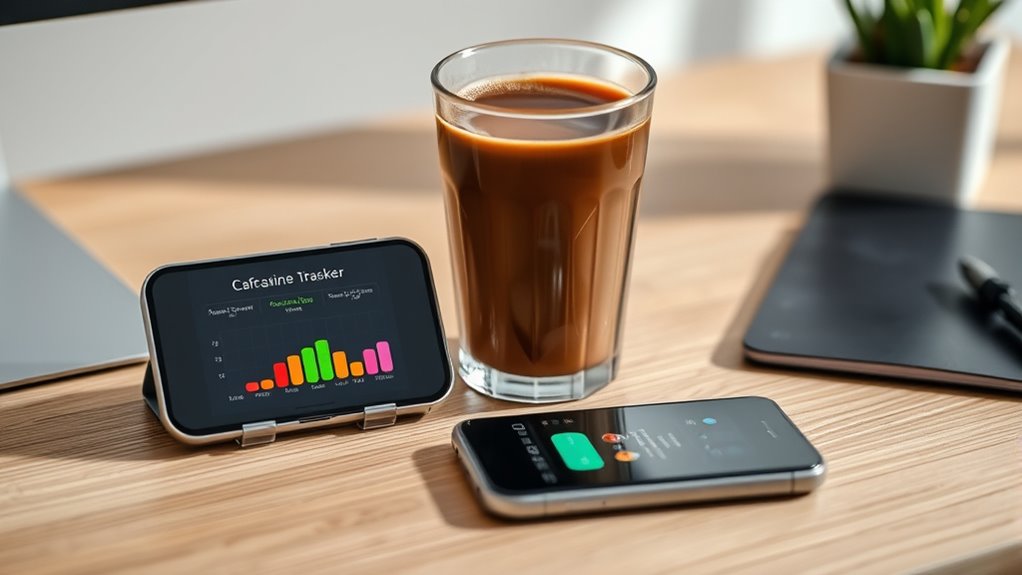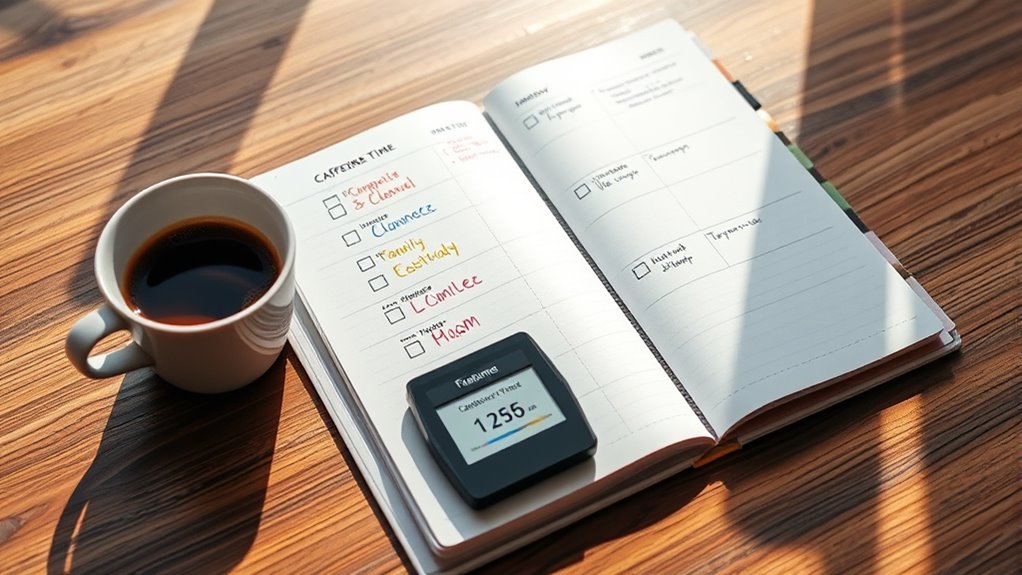To manage your caffeine levels effectively, aim to consume it strategically throughout the day—most people find that having caffeine mid-morning and early afternoon works best. Avoid late-day drinks to prevent sleep issues. Space out your intake to keep energy steady and listen to how your body responds, adjusting as needed. If you want to optimize your routine and stay balanced, keep exploring how to tailor your schedule perfectly for you.
Key Takeaways
- Monitor your body’s response to determine optimal caffeine intake frequency, typically avoiding late afternoon or evening consumption.
- Consume caffeine during natural energy peaks, such as mid-morning and early afternoon, to maximize alertness.
- Limit daily caffeine intake to up to 400 mg, spread out over 2-3 doses to prevent jitters or crashes.
- Space caffeine servings evenly, roughly every 3-4 hours, to maintain steady energy levels without overuse.
- Adjust the timing and amount based on personal metabolism and response, ensuring a balanced, sustainable caffeine schedule.
Understanding Caffeine’s Effects on Your Body

Caffeine quickly affects your body by stimulating the central nervous system, which can increase alertness and reduce fatigue. Once consumed, your body begins to metabolize caffeine primarily in the liver, and the speed of this process varies based on genetics, age, and health. Faster caffeine metabolism means its effects wear off sooner, while slower metabolism can prolong alertness but also increase the risk of side effects. Understanding caffeine’s metabolism is essential for managing its health implications, such as heightened anxiety, sleep disturbances, or increased heart rate. Your body’s response to caffeine depends on how efficiently you process it, making it critical to recognize your individual reaction to maintain a healthy balance and avoid negative consequences associated with excessive intake. Metabolic rate also plays a significant role in how quickly caffeine is eliminated from your system.
Determining Your Ideal Daily Caffeine Intake

To find your ideal daily caffeine intake, you need to consider recommended limits and how factors like age, weight, and activity level affect your needs. Personal tolerance varies, so what works for one person might not suit another. By paying attention to your body’s response, you can better determine the right amount for you. Incorporating creative practice into your routine can also help you develop a better awareness of your body’s signals and improve your overall well-being.
Recommended Daily Limits
Understanding your ideal daily caffeine intake is essential for enjoying its benefits without overdoing it. For most adults, up to 400 milligrams daily is considered safe—roughly four cups of coffee. Keep in mind, individual tolerance varies, so listen to your body. If you want to cut back, consider decaffeinated options or herbal alternatives like chamomile or peppermint tea, which provide comfort without caffeine. These choices help you maintain your routine while reducing intake when needed. Staying within recommended limits prevents side effects like jitters or sleep disturbances. Remember, moderation is key. Adjust your caffeine consumption based on your personal response, and don’t hesitate to explore caffeine-free or herbal options to balance your daily routine effectively. Using a personalized approach can help tailor your caffeine intake to your specific health needs and lifestyle.
Factors Influencing Needs
Your individual caffeine needs depend on several factors that influence how your body processes and tolerates it. Caffeine metabolism varies widely among people, affecting how quickly it leaves your system. If your body metabolizes caffeine slowly, you might experience sleep disruption even with small amounts. Conversely, faster metabolism may require higher intake to achieve the desired alertness. Age, genetics, and lifestyle also play roles in determining your ideal caffeine level. Consider the table below to understand these influences better: Caffeine processing speed
| Factor | Effect on Caffeine Needs |
|---|---|
| Caffeine metabolism | Slower metabolism increases sensitivity |
| Sleep disruption | Higher sensitivity demands lower intake |
| Age & genetics | Younger or genetically fast metabolizers need more caffeine |
Timing Your Caffeine Consumption for Maximum Benefit

Timing your caffeine intake can considerably enhance its benefits while minimizing potential drawbacks. To optimize caffeine timing, aim to align your consumption with your natural energy peaks. Typically, these peaks occur mid-morning and early afternoon, when your alertness dips. Drinking caffeine during these windows helps you stay focused and alert without disrupting your sleep later. Avoid caffeine late in the day, as it can interfere with your sleep cycle and reduce overall rest quality. Consider spacing out your intake to maintain steady energy levels throughout the day. By understanding your body’s rhythm and planning caffeine consumption accordingly, you maximize its benefits while reducing jitters or crashes. Proper caffeine timing guarantees you get the most out of each cup without overstimulating yourself.
Adjusting Caffeine Intake Based on Sensitivity and Tolerance

Everyone’s sensitivity to caffeine varies, so it’s important to recognize how your body reacts. Start by evaluating your own tolerance and adjust your intake gradually to avoid unwanted side effects. Making small changes helps you find the right balance without overdoing it. Incorporating creative parenting workshop ideas can also encourage healthier routines and habits around caffeine consumption.
Assess Personal Sensitivity Levels
Since caffeine sensitivity varies widely from person to person, it’s important to identify how your body responds to different amounts. Pay attention to your reactions after consuming caffeine—do you experience jitteriness, anxiety, or difficulty sleeping? Recognize signs of caffeine withdrawal, such as headaches or fatigue, which may indicate you need less caffeine overall. Your mental alertness might improve with moderate intake, but too much can cause crashes or irritability. By tracking how you feel after different doses, you can better assess your personal sensitivity. Understanding your unique response lays the foundation for a safe, effective caffeine routine tailored to your needs. Developing a growth mindset about experimenting with your intake can help you remain open to adjusting habits for optimal well-being.
Adjust Intake Gradually
Adjusting your caffeine intake gradually allows your body to adapt without experiencing sudden side effects like caffeine withdrawal symptoms. If you notice signs of withdrawal, such as headaches or fatigue, slow down your reduction process. It’s essential to listen to your body and make small adjustments over time. Pair these changes with effective hydration strategies to counteract any potential dehydration caused by caffeine. Staying well-hydrated helps minimize withdrawal symptoms and maintains your overall well-being. Remember, increasing or decreasing your caffeine intake too quickly can lead to jitters, anxiety, or crashes. By slowly modifying your consumption, you give your body time to build tolerance or reset sensitivity, leading to a more balanced and sustainable caffeine routine. Incorporating mindful consumption can also support your well-being and help prevent over-reliance on caffeine.
Recognizing Signs of Caffeine Overuse and When to Cut Back

Caffeine overuse can sneak up on you, especially when you start experiencing physical or mental signs that your intake is too high. You might notice irritability, trouble sleeping, or a pounding heart, which are common indicators. If these symptoms persist, you could face caffeine withdrawal if you suddenly cut back, causing headaches, fatigue, or mood swings. Recognizing these signs early helps you adjust your intake before dependence develops. When reducing caffeine, consider herbal alternatives like chamomile or peppermint teas to ease withdrawal symptoms naturally. Paying attention to how you feel after consuming caffeine helps you gauge your limits. Monitoring your caffeine intake and understanding its effects on your body can help you maintain a healthy balance. Knowing when to cut back ensures you avoid overuse, supporting your overall health and energy levels without risking dependence.
Creating a Personalized Caffeine Schedule for Steady Energy

Creating a personalized caffeine schedule can help you maintain steady energy levels throughout the day. To do this effectively, consider how your body processes caffeine through caffeine metabolism, which varies from person to person. Understanding your metabolism helps you determine the best times to consume caffeine, avoiding crashes or excessive intake. Incorporate your preferred beverages, whether caffeinated or decaffeination process-based, into your routine strategically. Adjust your schedule based on how quickly you feel the effects and how long they last. Tracking your responses will help refine your plan for consistent energy. Remember, balancing caffeine intake with your natural energy cycles minimizes overuse and supports overall well-being. Additionally, being aware of industry trends can help you stay informed about new products and methods to optimize your caffeine consumption.
Frequently Asked Questions
Can Caffeine Consumption Affect Sleep Quality Even if Consumed Earlier in the Day?
Yes, caffeine consumption can affect your sleep quality even if you drink it earlier in the day. It may cause sleep disturbances and circadian disruption, making it harder to fall asleep or stay asleep at night. Caffeine blocks adenosine, the sleep-promoting chemical, which can have lingering effects. To protect your sleep, consider limiting caffeine intake after mid-afternoon and be mindful of how it impacts your sleep patterns.
How Does Caffeine Tolerance Develop Over Time With Regular Intake?
You develop caffeine tolerance over time through tolerance buildup and metabolic adaptation. As you regularly consume caffeine, your body adjusts by reducing receptor sensitivity and increasing enzyme activity that breaks down caffeine. This means you need higher doses to achieve the same effects. To prevent this, consider moderating your intake, taking breaks, and spreading out caffeine consumption, allowing your system to reset and maintain its responsiveness.
Are There Specific Health Conditions That Influence Safe Caffeine Levels?
Think of your body as a vintage radio, sensitive to different signals. Medical conditions like anxiety, heart issues, or sleep disorders can make caffeine more risky. Genetic factors also influence how your body processes caffeine, affecting safe levels. If you have these health concerns, you should limit your intake and consult a healthcare professional. Staying aware of your unique medical profile guarantees you enjoy caffeine without compromising your health.
How Do Different Types of Caffeinated Beverages Impact Caffeine Absorption?
Different caffeinated beverages impact beverage absorption and caffeine bioavailability differently. For example, coffee tends to be absorbed quickly, providing a rapid caffeine boost, while tea releases caffeine more gradually. Energy drinks often contain added sugars that can influence absorption rates. Your body’s response depends on the beverage’s composition, so consuming varied sources affects how caffeine bioavailability varies. Pay attention to how your body reacts to each to manage your intake effectively.
Is There an Optimal Caffeine Schedule for Athletes or Those With Active Lifestyles?
You don’t need a rigid caffeine schedule, but timing matters for athletic performance. Aim to consume caffeine about 30-60 minutes before workouts for ideal energy and focus. Avoid late-day intakes to prevent sleep disruption, which hampers recovery. Consistent caffeine timing helps your body adapt, maximizing benefits. Listen to your body, and adjust based on your activity levels, ensuring caffeine boosts your performance without causing jitters or crashes.
Conclusion
By understanding your body’s response and timing your caffeine intake wisely, you can enjoy steady energy without overdoing it. For example, if you notice jitters or trouble sleeping, cut back or space out your drinks. Creating a personalized schedule helps you stay alert without reliance or crashes. Remember, listening to your body and adjusting accordingly guarantees caffeine benefits outweigh the risks, keeping you energized and healthy every day.









